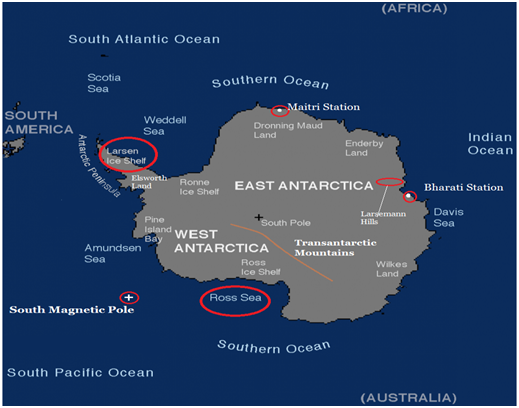

Context
Lok Sabha passes the Indian Antarctic Bill, 2022 aimed at having India’s national measures for protecting the Antarctic environment and dependent and associated ecosystem.
About
About the Indian Antarctic Bill, 2022
- The Indian Antarctic Bill, 2022 was introduced in Lok Sabha on April 1, 2022.
- The bill is in pursuant to India’s accession to the Antarctic Treaty, the Protocol on Environment Protection (Madrid Protocol) to the Antarctic Treaty, and the Convention on the Conservation of Antarctic Marine Living Resources.
- It also seeks to protect the Antarctic environment and regulate activities in the region.
Objective of the Bill
- To provide a harmonious policy framework for India’s Antarctic activities through a well-established legal mechanism, and facilitate activities of the Indian Antarctic program, including management of Antarctic tourism and sustainable development of fisheries.
- It also seeks to constitute a fund for the welfare of Antarctic research work and the protection of the environment of the icy continent.
Need for the Antarctic Legislation
- The growing presence of Indian scientists in Antarctica and the commitment to Antarctic research and protection prompted the government to adopt domestic legislation consistent with its obligations as a member of the Antarctic Treaty system.
- These laws will enable India’s courts to deal with disputes or crimes committed in parts of Antarctica, and help build credibility vis-à-vis India’s participation.
Key features of the Bill
Protecting Native Plants:
- There will be a strict prohibition on damaging native plants, flying or landing helicopters or operating vessels that could disturb birds and seals, using firearms that could disturb the birds and animals, removing soil or any biological material native to Antarctica, engaging in any activity that could adversely change the habitat of birds and animals, or harm them.
Prohibition on introducing Birds not native to Antarctica:
- Introduction of animals, birds, plants or microscopic organisms that are not native to Antarctica is also prohibited. Violators can face imprisonment as well as penalties.
Strict guidelines to regulate entry in Antarctica:
- The bill has listed strict guidelines and a system of permits, which will be issued by a government-appointed committee, without which any expedition or individual will not be allowed to enter Antarctica.
- The bill has a provision to establish a committee on Antarctic governance and environmental protection to monitor, implement and ensure compliance with the relevant international laws, emissions standards, and rules of protection.
Protecting Mineral Resources:
- The Bill further prohibits drilling, dredging, excavation, or collection of mineral resources or even doing anything to identify where such mineral deposits occur.
- The only exception is for scientific research with a permit.
- Provisions for Indian Tour Operators:
- The Bill also provides for Indian tour operators to be able to operate in Antarctica after acquiring a permit.
- There are 40 permanent research stations in Antarctica of which two –‘Maitri’ and ‘Bharati’are Indian.
Penalty system that has been introduced:
- Provision of a separate designated court to try crimes committed in Antarctica.
- It sets high penal provision: the lowest penalty comprising imprisonment between one-two years and a penalty of Rs.10-50 lakh.
- Extraction of any species native to Antarctica, or introduction of an exotic species to the continent can draw imprisonment of seven years and a fine of Rs.50 lakh.
|
Prohibited activities:
|
Significance of this Legislation:
- To Fulfil Provisions under the Antarctica Treaty:
- India had been a signatory to the Antarctica Treaty since 1983 and that encumbered India to specify a set of laws governing portions of the continent where it had its research bases.
- The Treaty made it mandatory for the 54 signatory countries to specific laws governing territories on which their stations are located.
- Preserve the Pristine Nature of the Continent:
- India is also a signatory to treaties such as the Convention on the Conservation of Antarctic Marine Living Resources and the Commission for Conservation of Antarctic Marine Living Resources.
- Both the conventions enjoin India to help preserve the pristine nature of the continent.
- Applicability of Indian laws: Indian laws will be applicable in the area occupied by Indian institutions and Indian personnel living in that continent.
|
About Antarctica Treaty:
Objective:
|

About Antarctica:
- Antarctica is uninhabited except for those manning the nearly 40 permanent stations established by several countries, including India, for carrying out scientific research.
- India maintains two research stations on the continent:
- ‘Maitri’ (commissioned in 1989) at Schirmacher Hills and
- ‘Bharati’ (2012) at Larsemann Hills.
-
- It has also launched 41 scientific expeditions every year thus far. Together with the ‘Himadri’ station in Svalbard, above the Arctic Circle, India is among an elite group of countries with multipleresearch projects in the Polar Regions.
- Antarctica is Earth's southernmost continent. It contains the geographic South Pole and is situated in the Antarctic region of the Southern Hemisphere.
- At 14,000,000 square kilometres, it is the fifth-largest continent.

Conclusion
Environmental monitoring in Antarctica has, for example, led to the discovery of the seasonal depletion of atmospheric ozone over the Antarctic.As the Antarctic Treaty System matures it has become recognized as one of the most successful sets of international agreements, setting an example of peaceful cooperation for the rest of the world. As an environmental regime it is unique – an entire continent, which is essentially undisturbed, will remain protected because of the commitment and cooperation of the Treaty parties.
Antarctica is a natural reserve that is devoted to science and peace and to ensuring that Antarctica does not become the scene of international discord.



